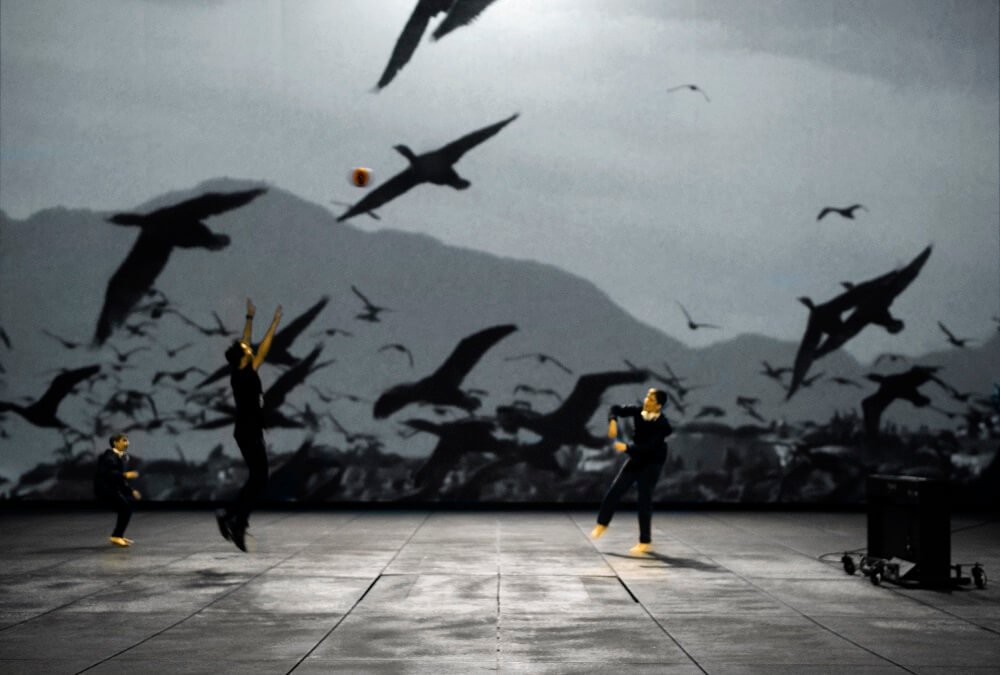
You would never say that Mari Carmen Tous is 85...

We are beginning to take in that it is possible...

According to the United Nations, attracting the financial system is...

Three Catalan restaurants – El Celler de Can Roca (2),...

The patient will wear a bracelet with a tag connected...

The printed book is a technological device dating back to...

In Stuttgart there are two imposing museums for two leading...

Jane Goodall travels the world 300 days a year asking...

The laboratory was set up with the aim of turning...

Film, from the beginning a way to portray the unportrayable...

Música clásica sobre la arena de la playa en dos...

The first session of the cycle on the regatta organized...

The hospital's managing director, Manel del Castillo, and the pharmaceutical...

Generalitat y Ayuntamiento impulsarán dos equipamientos de 'Casa de les...

Leticia Beleta, director of Alexion Pharmaceuticals in Spain and Portugal,...

We all have a friend who never leaves the Gràcia...

Barcelona director opts for Best International Film with 'La sociedad...

The hotel and industrial sectors softened the market's decline last...

The technology company, with a workforce of 35 employees and...

“The women of yesteryear were strong and had to fight...

[dropcap letter=”M”]
edea vociferates in the superb, pell-mell performance by Emma Vilarasau. The spite, the rejection of her lover Jason – who is more interested in Creon’s daughter, Glauce, whom he is supposed to marry – sparks a pique which corrodes, and the viewers must be aware of this. More than being dramatic, the opening scene oozes pathos. Without time to acclimate their ears, the keyboard of expressiveness is pushed to its max, which leads to a state of perplexity; there is a dissonance between what is implied in the tragedy and the spectators, who find it hard to empathise from the very start. There are no nuances in the almost automatic, artificial declamation; Medea is possessed and so she will remain, in the gradual modulation of a discourse in which the more she seems to nail it, the more she goes off course. Even though the first tragedy to spread her myth was the one written by Euripides in 431 BC, the imprint of Seneca’s version, almost 500 years later, is clearly at the fore of the version by Alberto Conejero and Lluís Pasqual, directed by the latter at the Teatre Lliure.
The voice of the main character booms and overpowers those of the other characters, including Creon, King of Corinth. Her powerful words cannot be silenced, Seneca recalls in his tragedy. To depict the priestess’s vulnerability yet paradoxical privilege, the staging relies on minimal resources, yet – despite this – it features skilfully used passages of technical artifice: the water curtain at the beginning and end, the pond which opens, which emerges from nothingness under the actors’ feet and allows Medea to materialise the cruellest and most unacceptable idea – killing her own children – as well as video passages which reflect a swampy Barcelona in black and white. Those phantasmagorical images of the city – fortunately, quite different from its usual appearance – alternate with the random reality of the birds and animals of prey, which survive by destroying other lives, following no law other than instinct. Because of her knowledge of the dark side of the natural order, the mythical figure of Medea participates, much to her chagrin, in this lawless vein. And therein lies her tragedy: not being totally animal – even if she knows and participates in the inscrutable mysteries of nature – renders her guilty, the victim of the moral principles which she violates and yet proclaims with equal vehemence.

The actress herself warms up and creates the character herself. She is still incomprehensible – barely or not at all reasonable, in her inspired journey – but the spectator has picked up on this internalisation. Vilarasau’s total exposure matches the role of victim: a self-imposed role which Medea seems to choose counter to her own interests. She is not satisfied with her status as a foreigner, nor of course does she tolerate her expulsion. She plunges into punishing Creon aware of her sorceress’s arts, and perhaps trusting in the final complicity of the Muse, the deus ex machina who will save her, much to Jason’s perplexity, as he loses the woman who was to be his future wife and his children because of Medea’s actions. She is a character that does not embody evil in the Manichaean sense, but who in Pasqual’s version is not exactly equipped with modern psychology either. So the absurdity that characterises her is foregrounded, suspended like a fine mist, an almost poetic yet uncomfortable vapour which is impossible to see through.

[dropcap letter=”M”]
edea vociferates in the superb, pell-mell performance by Emma Vilarasau. The spite, the rejection of her lover Jason – who is more interested in Creon’s daughter, Glauce, whom he is supposed to marry – sparks a pique which corrodes, and the viewers must be aware of this. More than being dramatic, the opening scene oozes pathos. Without time to acclimate their ears, the keyboard of expressiveness is pushed to its max, which leads to a state of perplexity; there is a dissonance between what is implied in the tragedy and the spectators, who find it hard to empathise from the very start. There are no nuances in the almost automatic, artificial declamation; Medea is possessed and so she will remain, in the gradual modulation of a discourse in which the more she seems to nail it, the more she goes off course. Even though the first tragedy to spread her myth was the one written by Euripides in 431 BC, the imprint of Seneca’s version, almost 500 years later, is clearly at the fore of the version by Alberto Conejero and Lluís Pasqual, directed by the latter at the Teatre Lliure.
The voice of the main character booms and overpowers those of the other characters, including Creon, King of Corinth. Her powerful words cannot be silenced, Seneca recalls in his tragedy. To depict the priestess’s vulnerability yet paradoxical privilege, the staging relies on minimal resources, yet – despite this – it features skilfully used passages of technical artifice: the water curtain at the beginning and end, the pond which opens, which emerges from nothingness under the actors’ feet and allows Medea to materialise the cruellest and most unacceptable idea – killing her own children – as well as video passages which reflect a swampy Barcelona in black and white. Those phantasmagorical images of the city – fortunately, quite different from its usual appearance – alternate with the random reality of the birds and animals of prey, which survive by destroying other lives, following no law other than instinct. Because of her knowledge of the dark side of the natural order, the mythical figure of Medea participates, much to her chagrin, in this lawless vein. And therein lies her tragedy: not being totally animal – even if she knows and participates in the inscrutable mysteries of nature – renders her guilty, the victim of the moral principles which she violates and yet proclaims with equal vehemence.

The actress herself warms up and creates the character herself. She is still incomprehensible – barely or not at all reasonable, in her inspired journey – but the spectator has picked up on this internalisation. Vilarasau’s total exposure matches the role of victim: a self-imposed role which Medea seems to choose counter to her own interests. She is not satisfied with her status as a foreigner, nor of course does she tolerate her expulsion. She plunges into punishing Creon aware of her sorceress’s arts, and perhaps trusting in the final complicity of the Muse, the deus ex machina who will save her, much to Jason’s perplexity, as he loses the woman who was to be his future wife and his children because of Medea’s actions. She is a character that does not embody evil in the Manichaean sense, but who in Pasqual’s version is not exactly equipped with modern psychology either. So the absurdity that characterises her is foregrounded, suspended like a fine mist, an almost poetic yet uncomfortable vapour which is impossible to see through.
